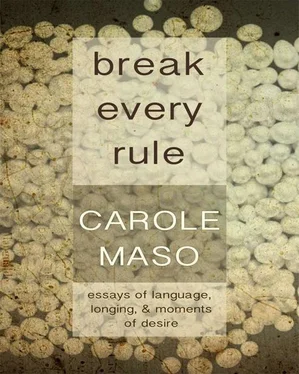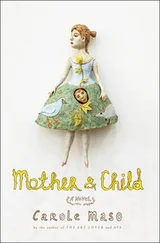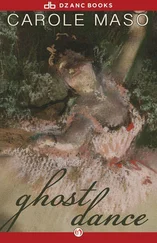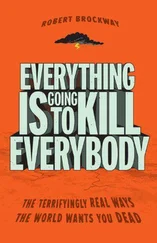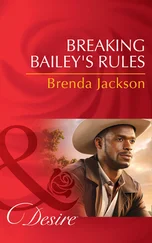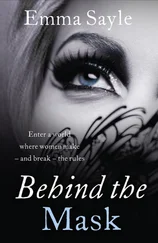I was destitute, and I had no prospects of publishing. My press, the noble North Point Press, about to do my third book, had just folded, and the New York publishers were less than enthusiastic. What choice did I have? And so once again in sadness, in weariness, my leave-taking began. There had been so many leave-takings already. I would leave France, leave home (New York City), leave Helen, to do a job that I was unconvinced could even be done, in an imaginary Midwest, in a place called Normal.
Landing at the Bloomington, Illinois, airport and looking up into a sky of utter vastness, I felt I was falling upward into a dizzying blue sea. It was captivating here in its vastness, its flatness, its nothingness. I have never seen anything quite like it. Only vaguely does it recall Aries, which Van Gogh thought recalled Holland.
All summer I had walked in lushness, caressed by light, by olive and lemon and fig trees, embraced by gently rolling hills. Because my time in France was coming to its inevitable end, it had become too beautiful there, too painfully perfect. My parting became a kind of unbearable opera of longing. But then, overnight it seemed, there I was in the Midwest, and there was nothing, and the nothingness, the weird, fierce resignation of it was somehow exhilarating. I surrendered in seconds to this void, and like all landscapes I form a permanent bond with, it, at a crucial moment, a moment of crisis, of change, happened to mirror my internal state identically. My remoteness, my desolation. Stepping off that plane, the world was devoid of everything, a clean slate of sky, a nihilism of space, empty, the end, and yet it was oddly beautiful — like my own brand of nihilism.
And so I am dropped headlong into a strange land, a world utterly alien to me: world of dramatic and violent weather, dramatic and resolute landscape, dramatic and bizarre academia. Weird world of students and faculty and politics and paper. I have not been in school for a very many years. And from this vantage point the university seems as odd and coded and impenetrable as just about anything. Because I am just the visiting artiste , I do not have to go to faculty meetings, but I do anyway for their circus-like aspects. I go to academic parties for the spectacle, the Who’s Afraid of Virginia Woolf qualities, the bizarre vocabulary, the accents. I roam Normal/Bloomington memorizing middle America. I am a tourist, and there are many fascinating things out there. I come to class in the first week with my findings. At the hospital down the road I tell them there is a stone bench and engraved into the bench is written, “Today we prepare for our dreams of tomorrow.” I tell them as students of writing it’s going to be tough going, as they can go and see for themselves, because the clichés are literally written in stone.
In my tour of downtown Bloomington I see a radio tower that looks a lot like the Eiffel Tower. How far I think I’ve come from anything even a little familiar.
Luckily there are a few new friends: a colleague and fellow fiction writer who murmurs “Blanchot, Blanchot, Blanchot,” like a prayer, like the way out of here; another who loves the local band Thrill Kill Cult and Beckett. And of course there is Lucia. Having gotten me into this thing, she takes full responsibility. We swim together several times a week. We take trips to Chicago. She saves me with her thousand generosities: her impromptu three-course Italian meals, her gossip, her poems. Also, she is an extraordinary scholar. She allows me to sit in on her German Romanticism class. She lends me the Novalis translations she has done. It’s ecstasy then. Lucia, high-spirited, determined, with her stubborn Tennessee accent, does all she can to cheer me up. She says not to feel so bad — after twenty-five years in Bloomington, she still does not feel at home here.
And there is the woman who the day I arrive has already left five messages on something called the Voice Mail. She implores me to let her enter the class. She is older, about my age. She, too, becomes my friend, with caution, because she is my student, and I know from the first day of class that this is a sacred relationship. It’s a delicate balance to maintain, and a crucial one. There are only a few things I tell myself in the beginning: work the students as hard as you work yourself, and respect with your entire being that relationship (in other words, no matter what, do not sleep with them). I am so lonely here. Helen, back in New York, shows no signs whatever of visiting.
In a surprising and unanticipated turn, I end up adoring my students, feel them to be more talented than most of the published writers I have come across, want to celebrate their instincts, their feeling for language, their willingness to try anything with me. They seem unreasonably hopeful, perky, wholesome — but I consider that this may be just in comparison with the French. They are diligent, intelligent, open-minded, and, like the landscape, filled with longing and possibility.
Stupidly and naively and without any real feeling for their actual lives, I come to class one day thrilled with an event from the evening before — a tornado! The weird, green sky, the awful silence, the seemingly backward-flying birds. I tell them of my fantasy: to go to the thing’s center, to be obliterated, to achieve oblivion. In reality when the tornado comes I have no idea what to do and feel scared. No key to the basement, I stay in my attic apartment alone, the radio saying over and over, take cover. I’m afraid — and there’s no one here to die with me. The class is clearly appalled by my comments. What do I know of the grief such phenomena have caused them, their families? Immediately I regret my flippant tourism. The next day I go into a brief but heartfelt apology. I have learned something. What was I thinking? After my apology they slowly begin to trust me. They tell me about cows and corn and the prairie. The semester can begin, finally. I seem like a New Yorker to them: exotic, ridiculous, impractical, and yet somehow credible (it must be the two books), or, if not entirely credible, at least worthy of trust. And I think they enjoy teaching me things, the roles reversed.
Writing classes are about trust, of course, and after a while, in the safe place we have created together they begin writing their dreams, their fantasies, their desires. What many of them write about again and again is a thing they have never seen — the ocean. I am so moved by their longing — these children of the Midwest, these children of ISU — cinder-blocked, landlocked. They swim in high water. They never tire. They begin to learn how to write themselves free.
My graduate class at first makes me a little nervous. After all, I have never been to graduate school myself. I have never been in a writing workshop before. I have never taught anyone anything. But they, too, are unreasonably kind.
Still, something is a little off. I am often lost there, disoriented. The boys seem too perfect, too polite. I am amazed at the heightened, garish sexual fantasies they inspire. And the girls — they’re too complacent, too nice. I realize that part of why I’m here is to teach them to be bad, to question, to disobey. Normal: I feel on the edges of town and then out into the countryside, the severity of farmers, rising at dawn, eating dinner at five and to bed. They would not approve of me, these men. There’s a certain unreality to everything I see or perceive. Here, where people still eat lots of beef and lots of candy bars and smoke cigarettes, and many — it is true, as the French like to say of Americans — are overweight. The fat people for the circus must be grown out here, I think in a dream. And even the university is a paradox, a very unusual place. On the outside it is a lot of ugly buildings plunked down in the middle of nowhere. On the inside there is a gleaming altar to the most innovative and experimental literature in the world. It is taught here, it is valued, it is even published. Illinois State now houses both Dalkey Archive Press and The Review of Contemporary Fiction , as well as Fiction Collective Two. And in the Unit for Contemporary Literature, the dream of a literary avant-garde Utopia is slowly being realized. In this whole wide country there is no other place that comes close to it. Few places in the world come to mind. And my New York is light years away.
Читать дальше
